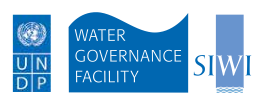The Stockholm International Water Institute (SIWI) released a report arguing for reform of groundwater governance in India, and outlining current challenges, barriers and capacity building needs.
 December 2013: The UN Development Programme (UNDP) Water Governance Facility (WGF) at the Stockholm International Water Institute (SIWI) released a report arguing for reform of groundwater governance in India, and outlining current challenges, barriers and capacity building needs.
December 2013: The UN Development Programme (UNDP) Water Governance Facility (WGF) at the Stockholm International Water Institute (SIWI) released a report arguing for reform of groundwater governance in India, and outlining current challenges, barriers and capacity building needs.
The report, titled ‘Groundwater Governance in India: Stumbling Blocks for Law and Compliance,’ notes that India’s development is highly dependent on groundwater resources, particular on irrigation from wells.
The report outlines challenges stemming from climate change, population growth and rising consumption, which place a growing importance on the role of aquifers in water storage. It analyzes legal and institutional frameworks for groundwater governance in India, highlighting that longstanding rights to groundwater in India are linked to land ownership. The author, Jenny Grönwall, reports that recent attempts to update water policies to vest groundwater rights in the state have limitations in their scope of application, have been resisted by existing rights-holders, and do not sufficiently address equity and sustainability concerns.
Based on case studies from the Indian states of Karnataka, Maharashtra and Gujarat, the author describes stumbling blocks to reform, including: path dependency; command and control systems that focus on licensing for new wells in only some areas; and maintenance of existing rights-holders’ access to groundwater, while stricter rules apply to new users.
She calls for reform of existing legislation, stronger institutional arrangements for implementation and enforcement, and improvements in human, administrative, technical and financial capacity among legislators and implementing authorities. She recommends involving groundwater users in aquifer mapping, as a way of promoting understanding of the need for public management of groundwater resources. She envisages a continuous process of reinventing and adapting water laws to the needs of society. [Publication: Groundwater Governance in India: Stumbling Blocks for Law and Compliance] [Water Governance Facility Website]